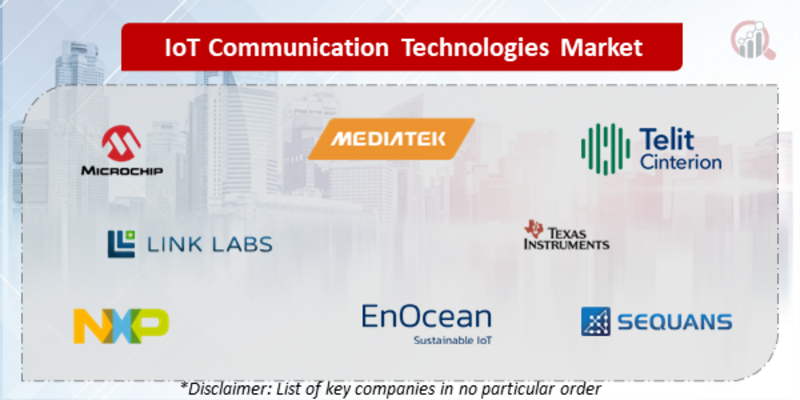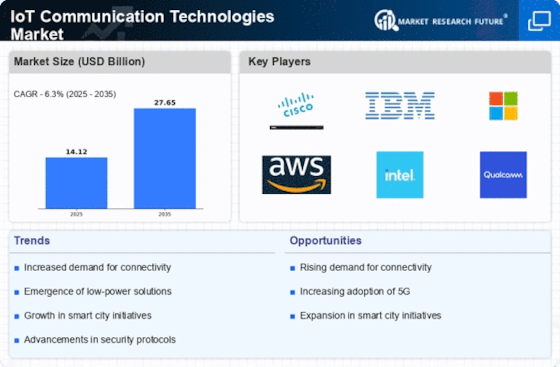Top Industry Leaders in the IoT Communication Technologies Market

The Competitive Landscape of the IoT Communication Technologies Market
The Internet of Things (IoT) is weaving a web of connectivity, linking everyday devices – from smart refrigerators to industrial sensors – to a symphony of data exchange. This connectivity rests on the shoulders of IoT communication technologies, the vital arteries facilitating the flow of information across this vast network. The market for these technologies, witnesses established giants and innovative startups battling for a share in the connected future. From low-power networks ideal for wearable devices to high-bandwidth solutions powering industrial automation, the IoT communication tech landscape caters to a diverse symphony of applications. Let's delve into the key strategies and players defining this vibrant realm.
Key Player:
- Microchip Technology
- MediaTek
- Telit
- Link Labs
- Texas Instruments
- NXP Semiconductors
- EnOcean
- Sequans Communications
- Gemalto
- STMicroelectronics
Strategies Adopted by Market Leaders:
- Technological Innovation: Companies aggressively invest in research and development, aiming for improved energy efficiency, higher bandwidth, increased network resiliency, and expanded range for IoT communication technologies. Developing novel network protocols, utilizing advanced chip designs, and pushing the boundaries of data transmission speeds are key differentiators.
- Diversification and Specialization: Recognizing the market's breadth, established players diversify their offerings, venturing into new application areas like smart cities, connected vehicles, and industrial automation, while niche players specialize in specific technologies like LPWANs or near-field communication (NFC) for short-range interactions.
- Security and Privacy Focus: As data security becomes paramount in the connected world, companies prioritize robust security protocols, encryption algorithms, and privacy-centric solutions to ensure trust and mitigate cyber threats. Addressing regulatory compliance and building transparency become crucial differentiators.
- Partnerships and Collaboration: Building partnerships with device manufacturers, cloud service providers, and system integrators accelerates market penetration and enables comprehensive IoT solutions. Collaborating with industry associations and fostering open standards strengthens the ecosystem and drives innovation.
Factors for Market Share Analysis:
- Revenue Generated: This straightforward metric reflects a company's market penetration and financial strength.
- Unit Shipment Volume of IoT Communication Modules: Understanding the number of modules sold across different technologies like cellular, Wi-Fi, and LPWANs provides insight into production capacity and market reach.
- Technology Portfolio Breadth and Depth: Analyzing the range of communication technologies offered in terms of data rates, network range, power consumption, and target applications reveals a company's ability to cater to diverse customer needs.
- Partnerships and Ecosystem Integration: Evaluating a company's partnerships across the IoT value chain, including device manufacturers, software developers, and service providers, sheds light on its ability to deliver comprehensive solutions.
New and Emerging Companies:
The influx of innovative startups is adding fresh connections to the market. Companies like MyThings Networks (Israel) and Helium Systems Inc. (USA) introduce novel solutions like blockchain-based LPWANs and decentralized mesh networks, enabling secure and scalable connectivity for diverse environments. They cater to emerging challenges like data ownership and network scalability, and expand the technology's reach into new realms.
Industry Developments:
Ingenu (USA):
- July 4, 2023- Partnered with a logistics company to deploy their LPWAN network for real-time asset tracking of cargo shipments.
MyThings Networks (Israel):
- June 9, 2023- Developed a blockchain-based LPWAN platform enabling secure and transparent data management for connected devices.
Helium Systems Inc. (USA):
- May 5, 2023- Expanded their decentralized mesh network to 50 countries, creating a global infrastructure for low-cost IoT connectivity.









